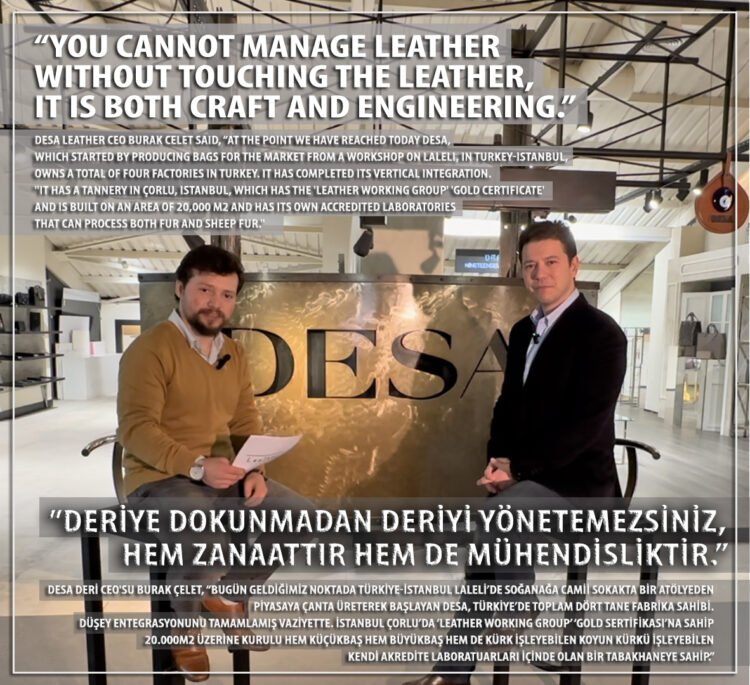Desa leather CEO Burak CELET said, “At the point we have reached today DESA, which started by producing bags for the market from a workshop on Laleli, in Turkey-Istanbul, owns a total of four factories in Turkey. It has completed its vertical integration. “It has a tannery in Çorlu, Istanbul, which has the ‘Leather Working Group’ ‘Gold certificate’ and is built on an area of 20,000 m2 and has its own accredited laboratories that can process both fur and sheep fur.”
Magazine Leather During our company visits, Desa Deri, the most important company of Turkey with its visionary history, having store chains in Turkey and various parts of the world in the field of Leather Garment, Footwear and Saddlery products, Mr. Burak ÇELET, the CEO of Desa leather with his visionary perspective we begin our interview with the kind of hospitality.

Mr. Burak, first of all, we would like to get to know you with your visionary perspective.
My name is Burak CELET, I was born in 1977 in Istanbul, just a few years after Desa, 1972, who I consider as my big brother. We are a family business and the company has always been an integral part of the family. I grew up in leather business since my childhood, and later I had the opportunity to direct my school in parallel with my professional goals related to leather business. After studying Mechanical Engineering at Istanbul Boğaziçi University in Turkey, I completed my MBA in USA on ‘Small business management’ and ‘finance’. After that, I completed my MSc (master’s degree) on leather tanning and leather technologies at Nene College in England. First, I started my own business for a few years, which was cutting and sewing leather onto leather, turning it into upholstery, and sending it flat packaged to England, where it was upholstered and turned it into furniture. By the end of the second year, I had around 220 employees and was exporting more than 10 million dollars annually. After couple of years of doing this work and gaining experience, our family company invited me to join the family business in 2004 and then I rolled up our sleeves for Desa. Since then, I have been working as a professional at Desa.
So, in order not to give up on your profession, you went to school, studied at a higher university and the tanning program, and then returned to Turkey.
That’s right, our profession is a profession where craftsmanship and engineering are combined and you really need to be hands-on. I have spent all my summer holidays here since I was six years old. During my education, I did almost all of my homework and projects on various subjects here. I also worked hard at the manufacturing bench. I still enjoy working in production with the craftsmen and solving problems, when necessary. That’s why our profession is a unique one that requires its participants to be good engineers and craftsmen simultaneously. You cannot manage the leather without touching it. You have to feel, know and and understand what the leather needs; I think it is both craft and engineering, our job.
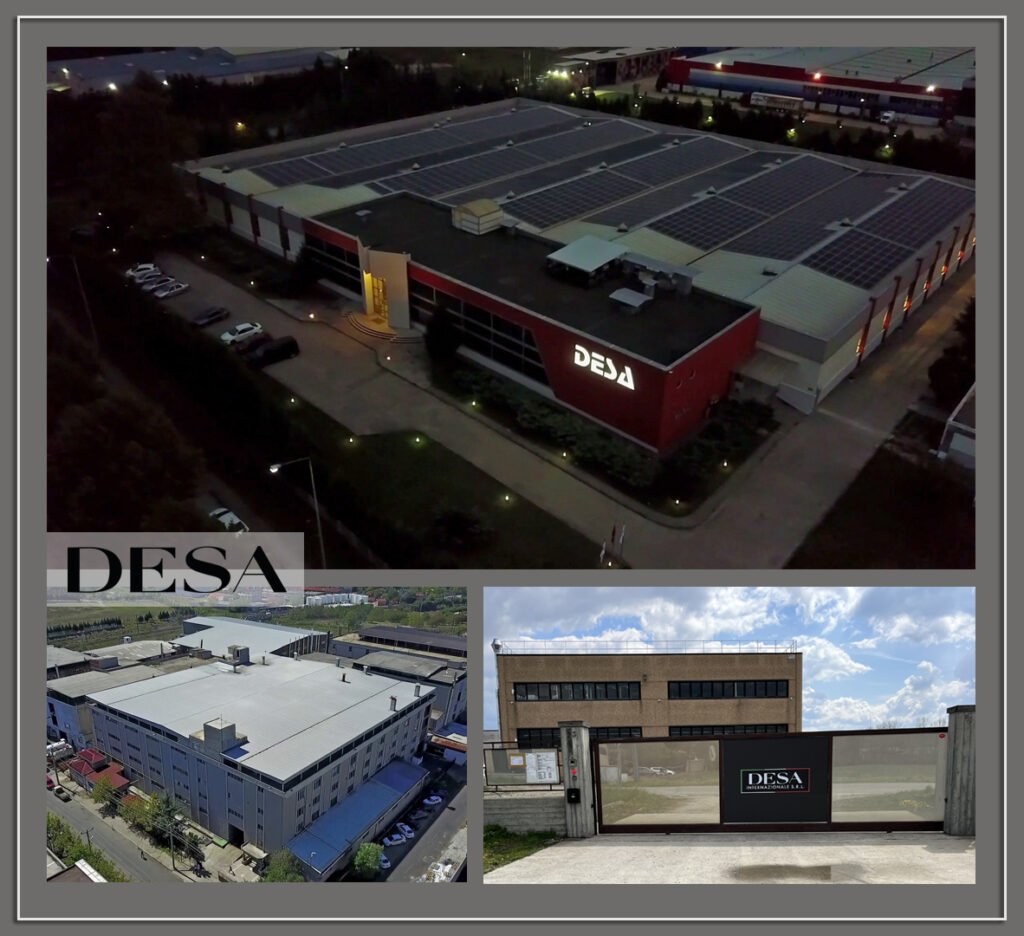

Could you tell us about DESA Leather, which was founded by your esteemed father?
Desa Leather is 51 years old today, born in 1972, and as I said, I like to consider it as my elder brother. Over the years, along with the developments in Türkiye, there have been many developments in Desa as well. When Desa first started, it actually started as a company exporting handbags to America. Of course, as conditions improved over time, the company completed both horizontal and vertical integration. There has been a major correllation between Turkey’s economic conditions and policies and Desa’s development and activities over the years. The other day, we started to prepare a book about history of DESA in honor of the 50th anniversary of the Company and it will be printed in very near future. While putting the story on the paper, I realized once again how significantly the economic and foreign policies of our country have impacted the strategic business decisions taken by the companyies in Turkey and as well as Desa. What do I mean; For example, although Desa started its journey by exporting to a company in America, a few years later it started exporting under its own brand. Before the first Gulf crisis, the Company had its own office in Empire State Building, New York, and its own warehouses in New Jersey. It sells goods under the Desa brand to more than 450 individual stores and 50 department stores in America. At the same time, he had his own office in Singapore and another office and distribution center in Germany. The Company was selling all of its production under the Desa brand. I am talking about the early 1980s, before the first Gulf crisis, before ‘Turquality’ was invented in Turkey, the beginning of the Turgut Özal period in Turkey, that is, 40 years ago.
However, later on, due to the various difficulties experienced by Turkey during the Gulf crisis, it was necessary to take a step back from all these initiatives, and Desa started to grow by producing for important global brands and acting as a kind of subcontractor for them. On the other hand, the Company continued its retail activities and never gave up its own stores, therefore, as you stated, It is one of the most important retail brands in Turkey’s leather industry. On the other hand, it has developed its production businesses around the world with important brands.
At this point today, DESA, which started by producing bags for the market from a workshop on in Laleli, Turkey-Istanbul, owns a total of four factories. It has completed its vertical integration. It has a tannery in Corlu, Istanbul, which has the ‘Leather Working Group’ ‘Gold certificate’ and is built on 20,000 m2 and has its own accredited laboratories that can process both sheep, cow and shearling. Apart from that, our headquarters, where we welcome you here today encompasses an area of approximately 18,000 m2 and houses 550 employees, who are involved in design, development and production of RTW, bags and wallets. Today, it has a factory in Düzce, Turkey, which produces bags for brands in the luxury segment, with approximately 600 people, in a facility of over 10,000 m2 that we established 20 years ago, that is, right after the 1999 Düzce earthquake. In addition to all these, we have a relatively smaller, modest facility of 2000 m2, which we recently opened in Tuscany, Italy, in the region just south of Florence, where all the luxury brands of the world produce and today 60 people are imployed in this facility. This is the production side of the business. Apart from these, Desa has approximately 60 stores in the country, all of which are its own.
Again, there is a very important and long-term partnership with Desa. For 41 years, Desa has been working on distribution and sales channels, not on the production side, in cooperation with the Samsonite company. This 41-year cooperation has been crowned with the establishment of a joint venture, after 25 years of distributorship. In the last 16 years of which we have managed a large region including Turkey, Azerbaijan, Georgia, Armenia, Northern Cyprus and the Middle East countries as the Joint Venture partner of Samsonite Group. Besides all this, of course, I mentioned the Italian facility, but the company is no stranger to Italy and has had his own showroom in Milan for 12 years. Today, we export our brand 1972 DESA to boutiques in 34 different countries, reaching from Chile to Korea, South Korea, Japan, and especially to Italy. Our brand is positioned in World’s leading boutiques and department stores. Desa started out as a small family business 50 years ago and has managed to become highly institutionalized public company quoted in the Istanbul Stock Exchange. I consider this to be a quite an accomplishment since our industry is very people dependent and hard to institutionalize.
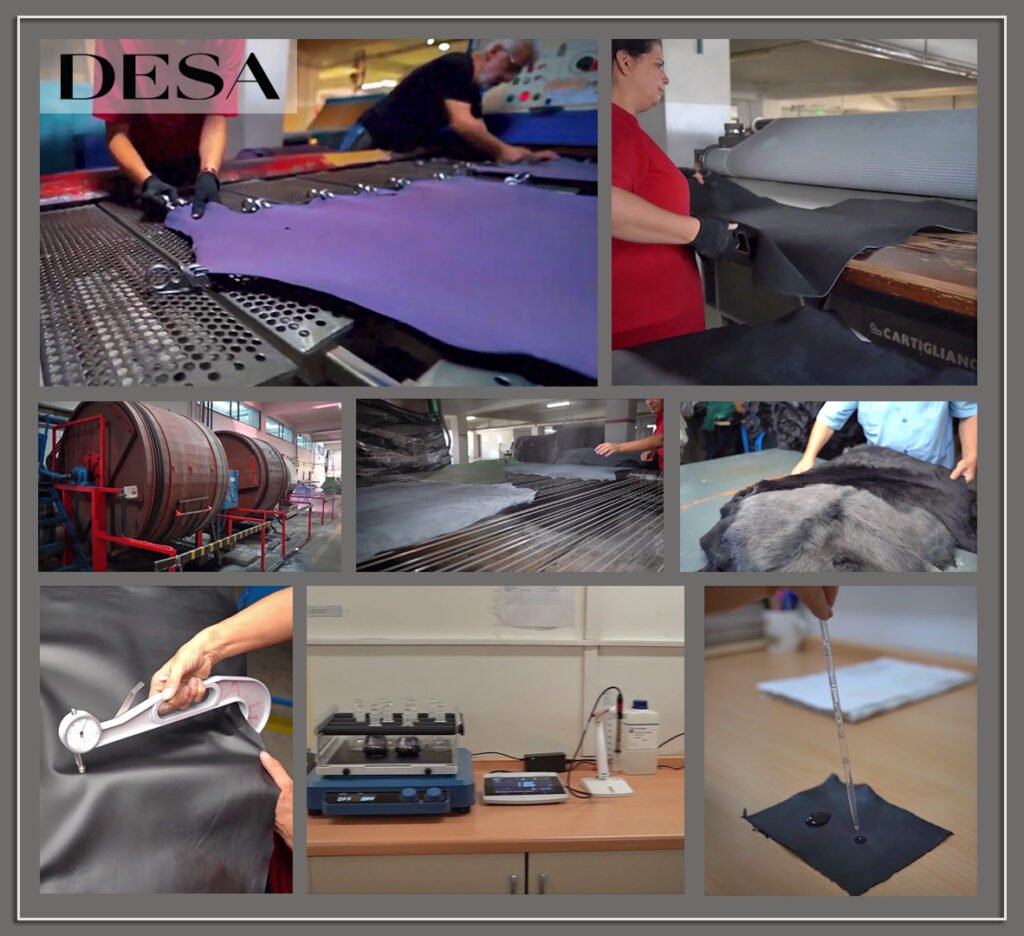
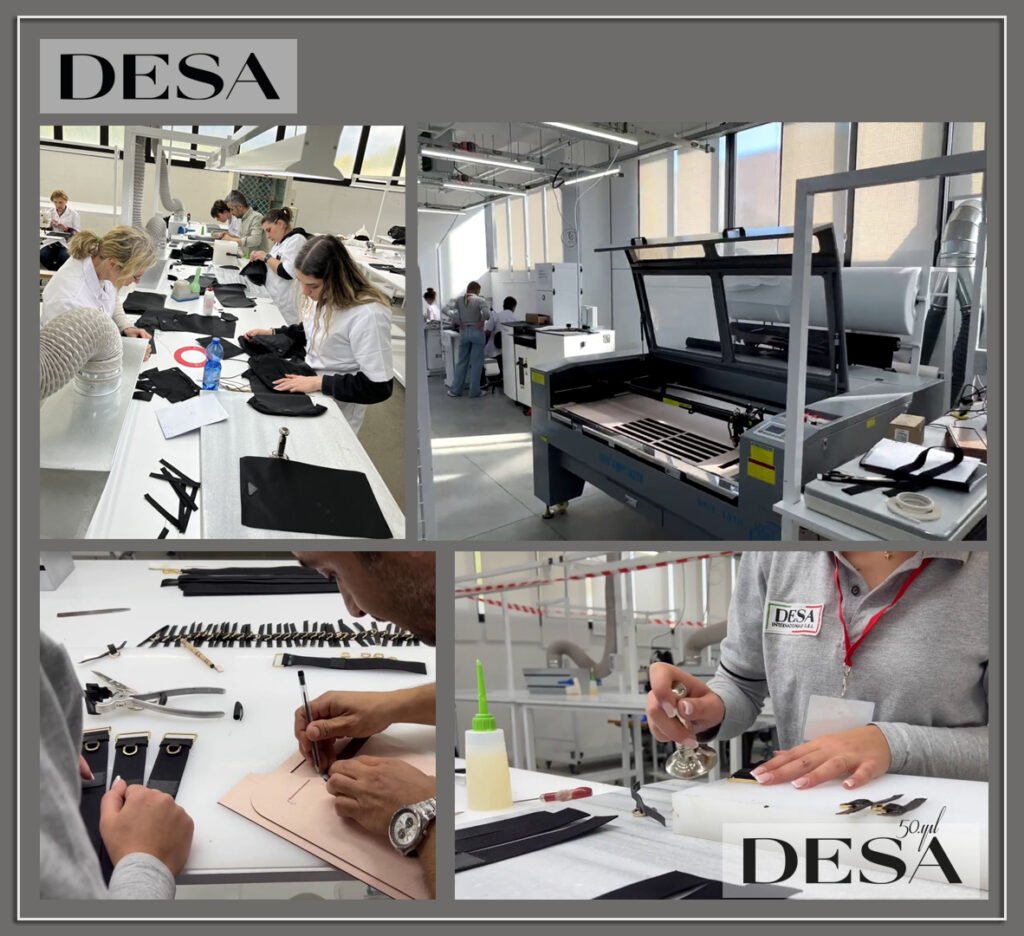
I would like to know your perspective on the leather industry. Can we learn your views on vegan and alternative industries?
As long as humanity eats meat and there is a meat industry on Earth, leather will always exist. Because we actually use a waste of the meat industry and the food industry and recycle it back into the economy. Do you know that many more animals and insects are killed in the making of a bread compared to producing of one steak? Therefore, I think veganism is a temporary trend. But above all, I think that the leather industry actually utilizes a commodity that is thrown away, a commodity buried in the ground, and brings it back into the economy. Moreover, as Desa, we do not use skins of any animal that is not raised for meat industry. Ninety-nine percent of the industry works this way, and it’s not just for us. We bring a material back into the economy that would otherwise be garbage. I believe that just as the leather industry is one of the first professions in human history, it is also one of the professions that will end at the end of human history, if all professions are to end.
Mr. Burak, as scientists and researchers say, there are already studies on the fact that burying the leather of an animal slaughtered for meat in the ground may cause climate change due to greenhouse gas emissions.

You mentioned that your current showroom focuses on leather garment, saddlery and footwear. Can you tell us about your position in the Turkish domestic market and the industry situation in the leather industry?
We are one of the leading brands in the leather industry in the domestic market. There are many valuable brands, but our most important difference from them is that we are still the only brand that to a large extent produces its own goods and is able to track its own raw materials all the way to the farm and has 100% vertical integration. We are the only Company in Turkish leather industry that is still a producer and a retailer from raw material to finished good. Therefore, we believe that we have gained favor and differentiated ourselves in the eyes of the consumers here.
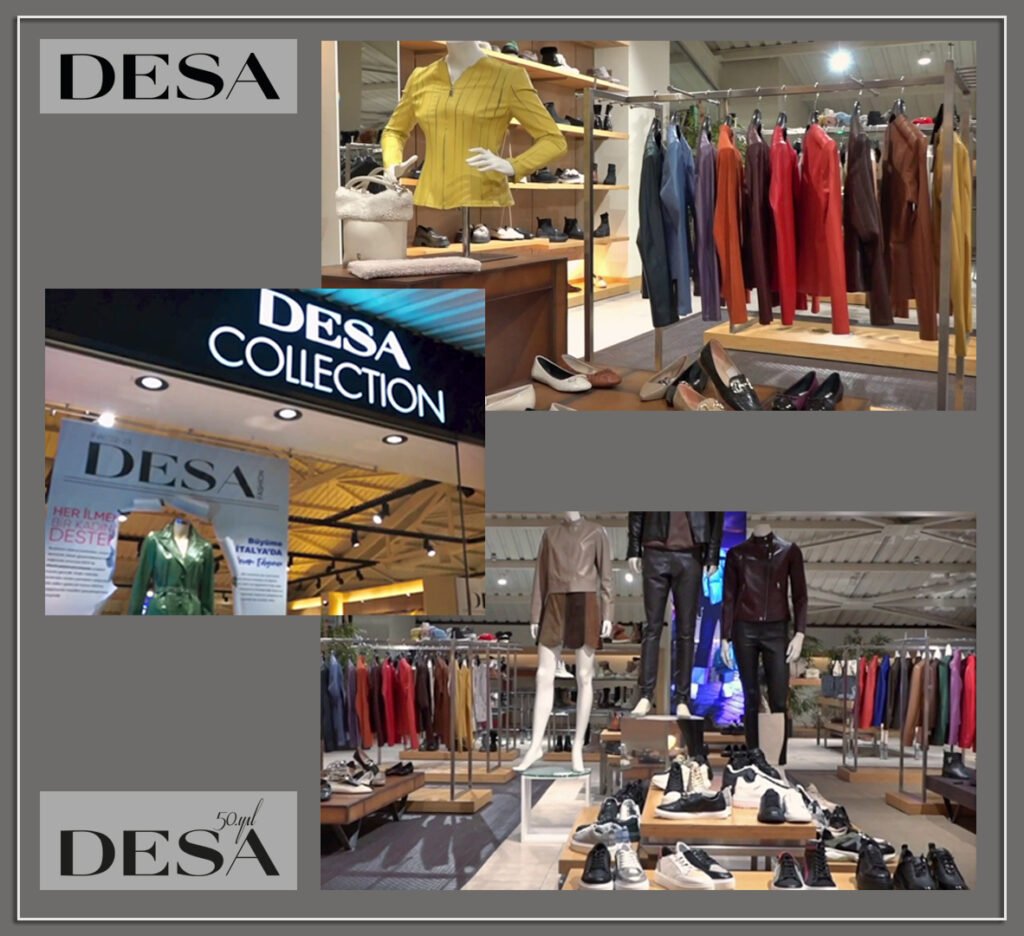
What is your perspective on leather wear fashion in the European market?
The leather industry should be evaluated under four main headings. We have four subsectors. The first is processed leather and fur, the second is leather wear, the third is saddlery products, and the fourth is footwear. Among these, footwear are an indispensable necessity. None of us can go out without wearing shoes. It is okay not to wear a leather jacket or a leather bag, but footwear are a must and I still believe that Turkey has a very serious chance in this regard. When it comes to saddlery products, especially the luxury segment is very valuable because it is an indispensable status symbol for women, people use these products as a status symbol. Therefore, it is a sector that is quite stable and continues with a certain performance over the years. Leather garments differ somewhat from these. Because leather garments are a little more influenced by fashion trends. Leather apparel, on the other hand, is a sector with higher volatility, as Turkey has experienced many times in the past. However, it is still an indispensable product in which every wardrobe has one or two leather jackets in every collection, but it is a product category that is much more popular in some years and a little less popular in others. Our 1972DESA brand in Italy is based on both Saddlery and Apparel products. As I just stated, we are present at Milan Fashion Week and Paris Fashion Week every season. We reach our end consumers by positioning the Desa brand alongside valuable, beautiful boutiques and well-known luxury brands.
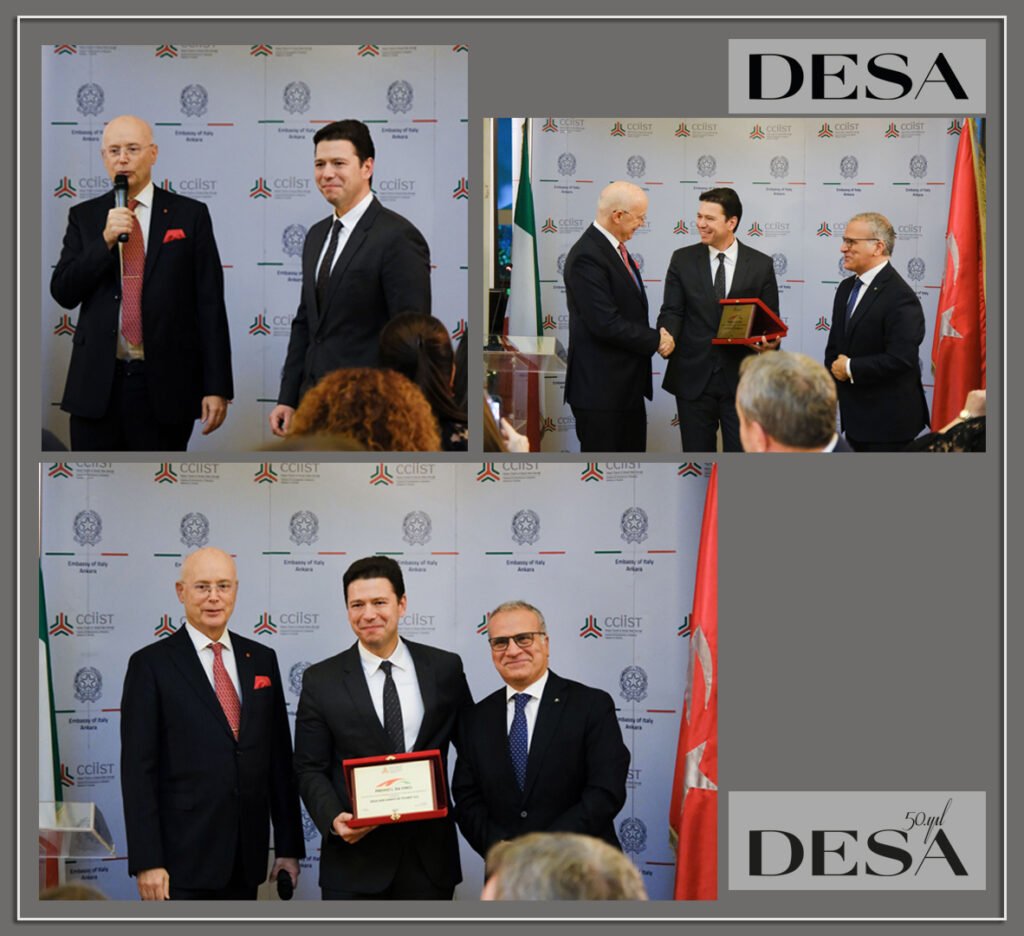
You received an award from the Italian consulate. Can you tell us about it?
It was a great honour bestowed upon by the Italian Government. A reception was held at the Venetian Palace, which is located on the same land right next to the Italian Consulate in Istanbul, that is, at the residence of the Italian Ambassador and Consulate General. Here, thanks to the organization and nomination of Italian Chamber of Commerce, every year they select and reward a company that from Turkey invests in Italy, and in the same way, they reward a company from Italy that invest in Turkey. As companies investing from Turkey, they chose us and showed us their favor. It was a very motivating and pleasant experience for us to receivethe Leonardo da Vinci award from the Ambassador of Italy in Turkey, Mr. Marrapodi. As I said, it is given only to one company every year, and it was a very pleasant experience that made us proud and motivated us. Opening a business is difficult, but yes, it is much more difficult to continue what we do.
Let’s wish you continued success.
Thank you very much…
There are fairs held in various countries. Do you attend them too?
We have been attending fairs for many years to follow up, but we do not just open a stand at the fair ourselves. Since when did this start? It started since we opened our own showroom.
We can usually meet all of our customers at our showrooms in Milan and Paris. The fair is a slightly faster and noisier environment, but in our showroom, you can host our customers in our own world, in the world of the brand, in a much more comfortable way, take orders much more calmly, and listen to the needs of the customer much better. Therefore, we have held many fairs in the past, and we have been continuing our sales through our showrooms rather than fair organizing for many years. We believe that we create better quality sales this way.
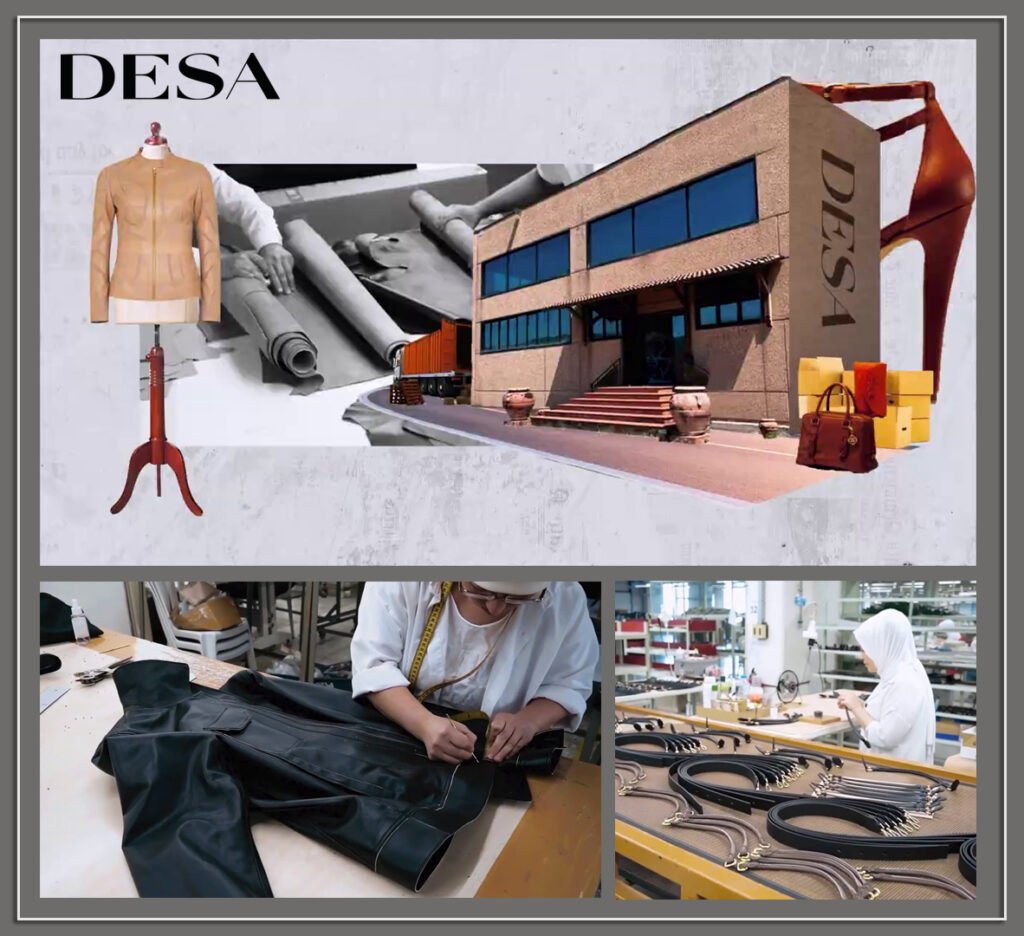
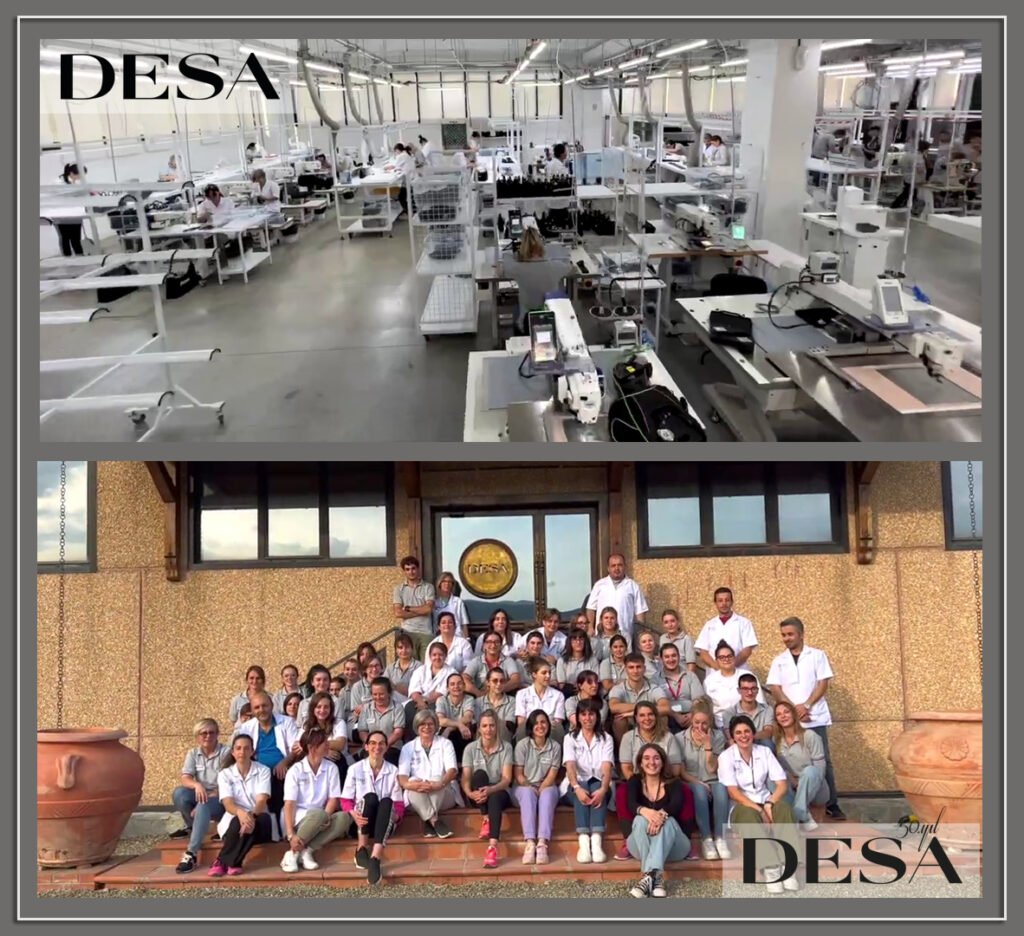
As your last words, do you have activities in this field of leather craft training and academia?
As you know, the biggest complaint of the sector is not being able to find trained workers. You’ll never hear anything like this from Desa. Today, Desa is one of the most important employers in the sector. We have approximately 2000 employees, 1250 of whom work in production. We are the only investment in the sector in Turkey-Düzce. After the 1999 Düzce earthquake, the first or second factory of our factory investment, Düzce 1st Organized Industrial Zone, was established in 2005. We took all our friends and young people from the fields there. They didn’t have any experience in our industry, we trained them all. When I looked at the numbers the other day, it was necessary for a statistics, I realized that we have trained over 5000 personnel over the years. Therefore, we are establishing our own academy within ourselves. In addition, we always have also formal apprenticeship schools, we have master instructors in them, and we carry out joint studies with vocational high schools. Every year, various numbers of our students receive training in our apprenticeship school.
Likewise, we are working on a similar project in Italy and established our own academy there as well. None of the people we hire have any previous background in this industry. Our young people, whom we trained from scratch in Düzce almost 20 years ago, Turkey, are teaching today in Italy as teachers. They went to the Italian Desa facility as managers and teachers. This makes me particularly proud. Frankly, it’s the point I enjoy the most. My colleagues from Duzce, who have learned the profession at Desa facilities, are teaching today the profession to Italians. Before relocating them we train them in all the necessary skills including management, italian language skills and of course all the steps of leather goods production. The relocate to the Italian facility to teach there and they become managers, masters and foremen. As I said, they are the thing that makes me most proud, because they show me the continuation and future of both my company and my business. We are an industry that can only exist as long as we have well-trained people and qualified personnel. For this reason, the training of that human resource gives me great pride, frankly, this is the satisfaction I get from my job. Sometimes they ask me why I do this job and I say I do it to be satisfied. What will give me greatest satisfaction and a sense of accomplishment is being able to see the future of my business. It is very valuable to be a 51-year-old company in the 100-year-old Republic of Turkey and to be able to take over from the first generation without dropping the flag. I hope that even if we are not here in 50 years, Desa will still be here and continue her life. It will continue to create employment.
Let’s wish you continued success. It sets an example for young people from here.
Mr. Burak, thank you for sparing your valuable time.
Thank you and I wish you success in your publishing life.







